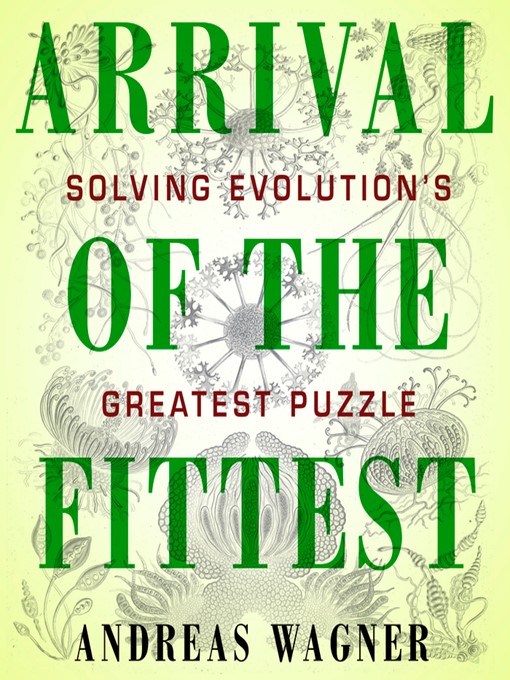Darwin's theory of natural selection explains how useful adaptations are preserved over time. But the biggest mystery about evolution eluded him. As genetics pioneer Hugo de Vries put it, "natural selection may explain the survival of the fittest, but it cannot explain the arrival of the fittest."
Can random mutations over a mere 3.8 billion years really be responsible for wings, eyeballs, knees, camouflage, lactose digestion, photosynthesis, and the rest of nature's creative marvels? And if the answer is no, what is the mechanism that explains evolution's speed and efficiency?
In Arrival of the Fittest, renowned evolutionary biologist Andreas Wagner draws on over fifteen years of research to present the missing piece in Darwin's theory. Using experimental and computational technologies that were heretofore unimagined, he has found that adaptations are not just driven by chance, but by a set of laws that allow nature to discover new molecules and mechanisms in a fraction of the time that random variation would take.
Consider the Arctic cod, a fish that lives and thrives within six degrees of the North Pole, in waters that regularly fall below 0 degrees. At that temperature, the internal fluids of most organisms turn into ice crystals. And yet, the arctic cod survives by producing proteins that lower the freezing temperature of its body fluids, much like antifreeze does for a car's engine coolant. The invention of those proteins is an archetypal example of nature's enormous powers of creativity.
Meticulously researched, carefully argued, evocatively written, and full of fascinating examples from the animal kingdom, Arrival of the Fittest offers up the final puzzle piece in the mystery of life's rich diversity.
-
Creators
-
Publisher
-
Release date
November 1, 2014 -
Formats
-
OverDrive Listen audiobook
- ISBN: 9781469060163
- File size: 244520 KB
- Duration: 08:29:24
-
-
Languages
- English
-
Reviews
-
Publisher's Weekly
June 30, 2014
Wagner, a professor at the Institute of Evolutionary Biology and Environmental Studies at the University of Zurich addresses the intriguing and long-standing question of how such a wide diversity of life arose. He doesn’t dispute the importance of natural selection, but argues that natural selection can only operate on the variability that exists; something more must permit nature to spread out in the manner it has. He concludes that mechanisms that lead to innovation are most important; innovations upon which natural selection can operate. Wagner discusses both the microbial and the multicellular world. In the former, horizontal gene transfer, the sharing of genetic material among individuals of many species, allows new genetic combinations to arise remarkably quickly. These are interesting results, presented clearly, but nothing new. His work becomes more remarkable when he discusses research, conducted largely in his laboratory, that demonstrates the number of ways there are to solve critical metabolic problems. One of his striking findings is that the mechanisms responsible for life are surprisingly robust: iterative mutations, far more often than anyone expected, can maintain and at times enhance an organism’s functionality. Wagner notes that “we can predict innovability even if we cannot predict individual innovations,” and his work further undercuts any arguments for intelligent design.
-
Loading
Why is availability limited?
×Availability can change throughout the month based on the library's budget. You can still place a hold on the title, and your hold will be automatically filled as soon as the title is available again.
The Kindle Book format for this title is not supported on:
×Read-along ebook
×The OverDrive Read format of this ebook has professional narration that plays while you read in your browser. Learn more here.

